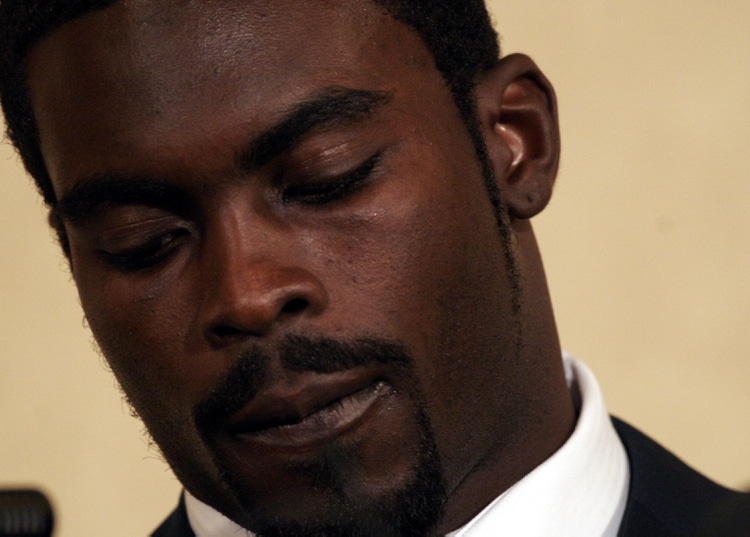Michael Vick, a name that resonates across the landscape of American sports, ignited a firestorm of controversy with his involvement in a gruesome dogfighting ring. The question of whether he served time for animal cruelty is pivotal, yet it broadly encapsulates deeper societal issues regarding our treatment of animals, the judicial system, and the intersection of fame and accountability. This case became not just a legal matter, but a crucible, challenging the very notions of morality, empathy, and justice in our culture.
Vick, once celebrated as a phenom in the National Football League, plunged from grace after the heinous revelations surfaced. The case began when federal authorities investigated a property in Virginia connected to Vick, discovering a nexus of cruelty that included underweight dogs, illegal gambling, and the brutal practices of dogfighting. The harrowing details of the operations at his home were appalling; dogs were found abandoned, emaciated, and in dire need of rescue. For many, the visceral imagery of these animals suffering brought forth an emotional reckoning—how could someone who so enthralled millions with athletic prowess engage in such barbarity?
The legal ramifications were exponentially severe. Vick was indicted on federal charges related to dogfighting in July 2007. He faced a myriad of allegations: operating a gambling business, conspiring to sponsor dogfighting, and engaging in acts of animal cruelty. Ultimately, Vick pled guilty to multiple counts of dogfighting and animal cruelty in 2008. He was sentenced to 23 months in federal prison, a punishment that many ardent animal activists felt fell tragically short of the moral gravity of his actions.
What is particularly poignant about Vick’s case is its role as a reflection of broader societal values. The juxtaposition of a beloved sports figure against the backdrop of unspeakable cruelty raised uncomfortable questions: How do we decide the worth of life? Does fame confer an unspoken leniency when faced with wrongdoing? The media frenzy surrounding Vick’s trial not only scrutinized his actions but also illuminated a cultural inflection point. The discussion surrounding his case rippled beyond the fantastic story of a once-great athlete gone astray; it beckoned society to confront our perceived values concerning animal welfare and ethics.
Moreover, it is essential to examine public sentiment regarding dogfighting itself. This gruesome activity, rooted in a long history of gambling and exploitation, often remains shrouded in ignorance. Many individuals fail to comprehend the extensive suffering inflicted upon these animals. The visceral nature of dogfighting, complete with its patrons, is a microcosm of the injustices that exist beneath the surface of human-animal relationships worldwide. Vick’s case acted as a stark spotlight, forcing a reckoning on what it means to engage with animals—whether as companions or as commodities.
The aftermath of Vick’s sentencing also stirred up passionate debate regarding rehabilitation and forgiveness. Following his release from prison, Vick attempted to rebuild his life. He became an advocate against dogfighting, albeit amidst skepticism. Would society allow a former perpetrator to advocate for the very cause he had once so violently transgressed? The unease that accompanied his rehabilitation speaks volumes about our collective values. How far can one truly return from heinous actions? Can redemption ever be fully realized in the eyes of those who bear witness to the aftermath of cruelty?
As Vick’s story unfurled publicly over the subsequent years, it elicited a spectrum of reactions. Some embraced him as a reformed individual, capable of imparting knowledge to prevent similar atrocities. Others viewed him as emblematic of the systemic failures in addressing animal cruelty, where celebrity status shields individuals from the full weight of their transgressions. The nuance and complexity of emotions surrounding this narrative ultimately encapsulate a societal dichotomy: the struggle for empathy and the yearning for justice.
Encounters with cases like Vick’s offer an opportunity to reflect on the societal structures that condone or overlook animal cruelty. Advocacy against such injustices requires unwavering vigilance, not just against recognized symbols of violence but against the insidious normalization of cruelty that permeates various facets of society. Education and awareness are paramount. They are the cornerstones upon which a more humane society must be built. The lessons gleaned from Vick’s trial should persistently challenge individuals to confront the uncomfortable truths surrounding animal welfare. It is a call to action to dismantle how we perceive, interpret, and interact with non-human creatures.
Indeed, Vick’s case instigated a dialogue far beyond the realm of sports, it interwove threads of ethics, celebrity culture, and animal rights. His time served for animal cruelty became a symbol, a reminder of the critical need for compassion toward all beings. As public opinion continues to evolve, it becomes increasingly necessary to advocate for structural changes that prevent cruelty and foster empathy. Looking deeper, it implores each individual to scrutinize their own perceptions of animal welfare and the enduring ramifications of our collective choices. Only through transformative understanding can we pave the way toward a future where compassion reigns supreme over cruelty.








